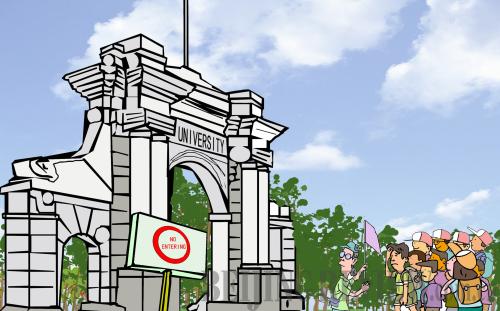|
 |
|
(LI SHIGONG) |
Xiamen University, one of the leading universities in China, began to ban tour groups from entering its campus on June 1. The notice of the university said that except for certain dining halls, most of the school's cafeterias will not receive tourists or accept cash. However, individual tourists are still allowed to enter the campus after registration.
Located in Xiamen, southeast China's Fujian Province, Xiamen University is widely recognized as one of China's most beautiful campuses, making it a hot scenic spot in the city. But the swarm of tourists has also created many problems in the campus, such as garbage and noise, which affected the school's teaching, research and students' daily life.
Actually, Xiamen University is not the only prestigious university in China to be plagued by crowds of tourists. Statistics show that in the summer of 2011, Tsinghua University and Peking University received an average of 16,000 tourists a day. Peking University used to receive applications daily from more than 100 travel agencies for permission to visit the university.
In order to prevent the large crowds of tourists from affecting their campus environment and teaching order, universities have already taken measures. Peking University limits tourists to 5,000 per day, and Tsinghua University sets its open time to be between 8:30 and 16:30 during the peak tourism time.
The move of these universities has triggered heated debate. Supporters say that campuses are places for students to study and students need a tranquil environment. Too many tourists will inevitably affect students' studies and daily life. Thus, these schools' measures are understandable. However, opponents argue that universities are public places, and so banning tourists from campuses is a silly and lazy policy which shows that universities don't want to spend too much time taking care of visitors. The following are excerpts of some opinions.
Supporters
Yang Qiufeng (www.cnhubei.com): Xiamen University is right in banning tour groups from entering its campus, which set a good example for other universities.
Nowadays, some travel agencies list prestigious universities as tourist sites. University students and teachers are greatly disturbed. Take Wuhan University in central China's Hubei Province for example—the university is famous for its spring cherry blossoms and thus, when the flowers blossom, the campus always becomes overcrowded. Then the school decided to charge ticket fees, saying that the income would help the university to strengthen the management. This practice is unwise. To what extent can a 10-yuan ($1.6) ticket prevent people from entering the campus? How does the university spend their ticket income?
Compared with Wuhan University, what Xiamen University has done is much more acceptable. Tour groups are banned from entering the campus, but individuals are still permitted to enter. If you want to feel the unique atmosphere of this beautiful university, you can go by yourself, instead of joining any tourist groups. Thus, students' normal life will not be interrupted and the school doesn't need to worry about how to keep the campus in order.
Universities are not scenic spots, but places of learning. A peaceful environment for teaching and academic work is the basic requirement. Visitors are free to appreciate the beauty of this university, but the precondition is that they should not disturb those who are studying and teaching there. Therefore, Xiamen University's practice is understandable and acceptable.
Hu Shixin (www.gmw.cn): Due to prestigious universities' fame and charm, tourists hope to appreciate the academic and historical atmosphere of these institutions. But the universities find themselves unable to accommodate and cope with the inflow of so many tourists on campus. The increase of tourists affects the normal operation of universities. Apart from the fact that the campus environment is damaged, other resources of universities are partly occupied by tourists, such as the dining halls. Xiamen University is trying to keep a balance between meeting tourists' demands and maintaining the school's order. It bans tour groups but is still open to individual tourists.
Tourists should also understand the difficulty the universities face. When visiting universities, they should try their best to protect the campus environment and not to interrupt the schools' normal order.
When the two sides learn to consider the issue from each other's perspective, the problem will be resolved and campus tours will no longer be a problem.
| 